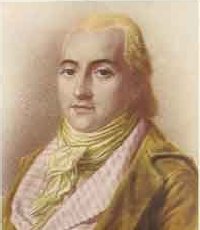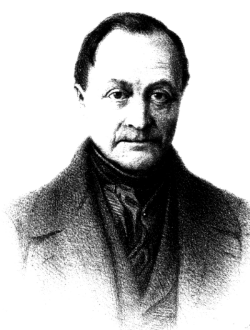|
Internal
|
|
Links |
|||
|
Need to re-organize (1st half is done)
|
|||||
|
|
- Biography & Major Works |
|
|||
| ST SIMON DEVELOPED AN EARLY SOCIAL SCIENCE WHICH HE HOPED WOULD
BE UNIFIED
W/ THE PHYSICAL SCIENCES, & INFLUENCED BY MANY ENLIGHTENMENT IDEALS |
|||||
|
|
Saint Simon called study of human conduct "Social Physiology" which he saw the as a science of social organization |
|
|||
|
|
Saint Simon conceptualized social physiology as a science of social organization |
|
|||
|
|
Saint Simon emphasized that historical change is at heart of society |
|
|||
|
|
Two intellectual currents shape St. Simon's thought, including: |
|
|||
|
|
1. The Enlightenment | ||||
|
|
2. Struggle btwn Romantics/Conservatives & Catholics |
|
|||
| Like Enlightenment thinkers, Saint Simon had faith in the power of reason to change world | |||||
| But Saint Simon disagrees w/ Enlightenment thinkers on the evaluation of the Middle Ages | |||||
| Saint Simon appreciated medieval unity & believed that science & industry sounded the death knell of the Middle Ages | |||||
|
|
Saint Simon hoped for a unified science, the physical & social sciences |
|
|||
|
|
Saint Simon hoped the human sciences would become united as had the natural & physical sciences |
|
|||
| During his lifetime, Saint Simon saw the dream of unification as fading | |||||
| Saint Simon viewed science as a body of verified & established beliefs that could replace religion | |||||
|
|
Saint Simon believes that human knowledge passed through 3 stages in development |
|
|||
|
|
1. Theological |
|
|||
|
|
2. Metaphysical |
|
|||
|
|
3. Scientific |
|
|||
|
|
SAINT SIMON ADVOCATED A MERITOCRACY OF 3 CLASSES |
|
|||
|
|
1. Scientists |
|
|||
|
|
2. Artists |
|
|||
|
|
3. Industrialists |
|
|||
| Saint Simon advocates a unification of bourgeoisie & professional classes, but the bourgeoisie repudiated him for his theology | |||||
|
|
St. Simon's class analysis is different from most analyses today |
|
|||
|
|
Saint Simon lumped together
- bankers - industrialists - scientists - mgrs. - & manual workers assuming they all share common interests |
||||
|
|
Saint Simon believed that a meritocracy should replace the existing class system: |
|
|||
|
|
In his Letters from an Inhabitant of Geneva, Saint Simon views old society as divided into three classes: |
|
|||
|
|
1. Intellectuals: scientists, artists, liberals |
|
|||
|
|
2. The "Haves:" property owners: resist change |
|
|||
|
|
3. The "Have nots:" the rest of humanity: wants equality |
|
|||
|
|
SAINT SIMON BELIEVED SCIENCE & RELIGION SHOULD UNITE |
|
|||
| Saint Simon believed that to achieve a unified religion, the new scientific elite must replace spiritual authority of the Church, providing a unified scientific doctrine | |||||
| For Saint Simon, the structure of society remains, w/ intellectuals replacing Church | |||||
| Saint Simon is imploring the propertied class to join intellectuals | |||||
|
|
Saint Simon's goals are to better humanity & create a new society |
|
|||
|
|
See Also: Saint Simon's new society | ||||
|
|
Saint Simon bases social theories on scientific evidence, but many believe that his conclusions were unsystematic |
|
|||
|
|
Saint Simon developed ideas of positivism, industrialism, internationalism, & a "new religion" before 1814 |
|
|||
| Later Thierry & Comte viewed Saint Simon's as their own ideas (see Link Comte's intellectual "borrowing") | |||||
| ST SIMON AGREED W/ HEGEL THAT HISTORY DEMONSTRATED A RATIONAL UNFOLDING OF SOCIETY | |||||
|
|
Saint Simon has a developmental view of history |
|
|||
|
|
While Hegel viewed historical development of society as increasing realization of reason, Saint Simon placed scientific knowledge in that role |
|
|||
|
|
For Hegel, |
|
|||
| - history & rationalization had stages | |||||
| - each stage of history & rationalization had stages w/ a degree of rationality, & therefore necessity | |||||
| - each stage of history & rationalization consisted of a struggle of opposing forces | |||||
| Hegel's stages may be seen as stages of ascent, maturity, & decline | |||||
| Saint Simon's theory is disjointed & piecemeal, but accepts many of Hegel's ideas | |||||
| Saint Simon believes that history has passed through the stages of: | |||||
| - polytheism | |||||
| - theism | |||||
| - & now physicism | |||||
| Society is now in the positive or scientific stage | |||||
| Today society is based on science, & has entered a positive stage where all knowledge will be unified on a scientific positive basis | |||||
| Science, industry, markets, Protestant Revolution, & negative critical philosophy of Enlightenment all undermined Catholic church & hence medieval society | |||||
| Social change is periodic or dialectical | |||||
| Society alternated btwn ‘organic periods’ & ‘periods of crises’ | |||||
| RELIGION & SCIENCE TOGETHER COULD FOSTER A BETTER SOCIETY | |||||
| Like Bonald, Saint Simon believed the stability of medieval Europe was result of its universally accepted religion | |||||
|
|
Religion should unite people on basis of common truths |
|
|||
|
|
For Saint Simon, the function of religion is to provide a coherent view of universe & human existence, uniting people on basis of common truths |
|
|||
| Knowledge could be taught as well as passed by rituals, cults, & mystical processes | |||||
|
|
Saint Simon's Internationalism held that social development cannot take place in a single country [ Marx agreed ] |
|
|||
|
|
Therefore we must develop a community of nations where despotism is eliminated |
|
|||
|
|
Science & positive philosophy must bind the nations of Europe into one international community, for w/o international order there can be no order or stability in individual societies of Europe |
|
|||
|
|
All European countries have similar a social, econ, & religious history |
|
|||
| MILITARISM & CLASS BASED INEQUALITY THREATENED SOCIETY | |||||
| Emergent industrial forces & spirit render the military spirit obsolete | |||||
| Military conflict hinders the development of industrial civilization | |||||
| Modern society is united by the need for security in production & liberty | |||||
| But StS did not believe in the survival of the feudal elements in society | |||||
| StS did not believe in the new nationalism in Europe which in the 20th C manifested itself as econ rivalry & led to WW I & WW II | |||||
|
|
StS recognized that the values of some classes threaten society |
|
|||
| WHILE INDIVIDUALISM WAS A HISTLY NEW SOCIAL RELATION, ST SIMON RECOGNIZED ITS WEAKNESSES | |||||
|
|
StS does not believe that the pursuit of individual well being will create societal good |
|
|||
| The value that the pursuit of individual well being creates societal good is a primary capitalist value today | |||||
| Unbridled egoism & consumption by rich, as well as rebelliousness of poor, will upset society in absence of a worldly ethic | |||||
| StS's beliefs on the need to dev an ethic to restrain egoism & chaos were accepted & dev by Durkheim | |||||
| ST SIMON WANTED TO USE THE SCIENCE OF SOCIAL CHANGE TO CONSTRUCT NEW INSTITS & A UTOPIAN SOCIETY | |||||
|
|
StS was a scientific materialist |
|
|||
|
|
Saint Simon believed that utopian ideals, even if carefully worked out in detailed political program, were useless if they did not take account of conditions that determine & mold historical change |
|
|||
| Utopian changes which did not take account of historical forces could create a vacuum that would eventually be filled by forces as undesirable as those expelled | |||||
| New institutions must be adapted to technical, economic, & social requirements of time | |||||
| While this seems quite sensible to us, most proposals for social change in Saint Simon's time were based on abstract values, ideals, religion, etc. | |||||
| Saint Simon is one of earliest thinkers to utilize social science | |||||
|
|
But Saint Simon was also an idealist who embraced what was later called Marxist's historical materialism |
|
|||
|
|
The dualism of mind & matter must be eliminated |
|
|||
|
|
The beliefs & knowledge of a given period create... religious ideas which... cause changes in history |
|
|||

Saint Simon 1760 - 1825 Born in Paris as Claude Henri de Rouvro, changed to Comte de Saint Simon SS had an aristocratic background; His ed was unsystematic He was self educated, except for some private tutors including Encyclopedist d’ Alembert He had visited Rousseau & so was familiar w/ Enlightenment ideas |
 |
||||
Letters from an Inhabitant of Geneva Published a magazine L’Industrie, beginning in 1816 Oeuvres Completes de Saint Simon et Enfantin, 1865-1876 |
|||||
Began a military career at age of 17. Among first to advance
a scheme for a canal to join Atlantic & Pacific. While his was
a noble family, SS advocated doing away w/ hereditary privileges.
He fought w/ distinction in Am Rev. Went to Am in his youth &
fought in Rev War. Was wounded in naval battle of Saintes.
SS took no active part in Fr Rev of 1789, though he welcomed it.
He was 29 at time. Despite subsequent disclaimers, SS was an
active supporter of some of measures introduced by Fr Rev, but was ambivalent
toward Fr Rev. He believed old systems, Ancient Regime, was doomed
& yet was averse to destruction. But he had been more pro revolutionary
than he wanted to admit: giving up his title, & presiding at
a commune. Although his rev zeal earned him certificates of civic
duty, his activities were not wholly disinterested. He bought a low
price church & émigré property. He was arrested
in 1793, but it was determined that a mistake was made & he was released
in a yr. He remained active in politics & participated in peace
negotiations w/ English at Lille. In 1814 found an enthusiastic collaborator
in future historian Augustin Thierry. Later retired from govt
& financial life, & began writing & traveling, esp. to Germany,
England, & Switz
|
|||||
